
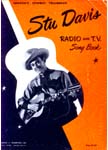


|
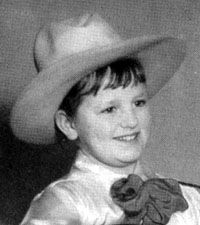 |
|||||||||||||||||||||||||||||||||||||
|
About The Artist
(Note: In Progress ...) James Leslie Sizemore was the eldest son of Asher and Odessa (Foley) Sizemore. He was born in Paintsville, Kentucky on January 29, 1927. The early performing years of Little Jimmie are covered in the biography of Asher Sizemore, his dad. Jimmie was probably one of the youngest stars of not only the WSM Grand Ole Opry but also on the radio in general. He made his debut on the Opry in December 1932 — at the age of five years old.
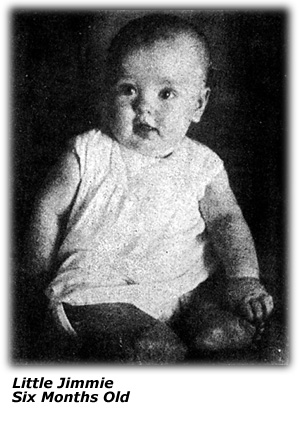
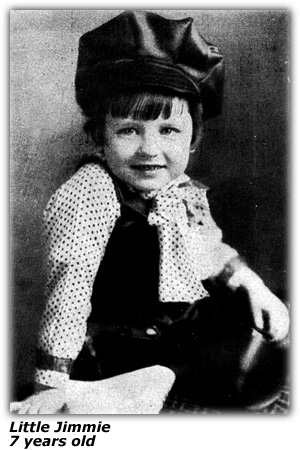 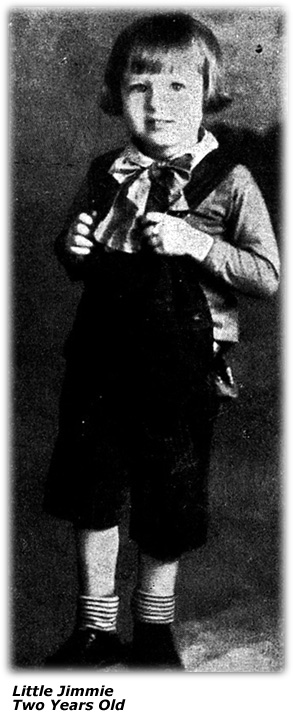 Opry Memories Consider his Opry experience. He performed on the Opry when it was held in the WSM Studios. Then the Opry moved to the Hillsboro Theater and Asher and Little Jimmie performed there as well. The Opry then moved to the Dixie Tabernacle and Asher and Little Jimmie were on stage there as well. Jimmie said he was intrigued by the harmonica for a time - he didn't know what a harmonica was. He said he had never been shown one or seen one or was too young to remember. Little Jimmie said DeFord could "...make that thing sing." His signature wong was "Pan American Blues," imitating a freight train. Jimmie always watched DeFord with attention when he heard him do that song — Jimmie kept trying to figure out how he did it. On a personal level, DeFord befriended Jimmie when they were at the Opry, waiting to go on stage. The two of them got into the habit of playing checkers on Saturday night before their time to perform. It seems he always found time to sit down with the youngster and play checkers. Oh, DeFord won more often than not or has Jimmie said, "...once in a while he'd let me win. I thoroughly enjoyed those sessions with him. He was the nicest to me I'd ever known." Jimmie got to know some of the early Opry stars as well as the Solemn Ole Judge, George D. Hay. He said he "loved that old man." Remember, his memories of Judge Hay were from when he was a child. Judge Hay let him blow the steamboat whistle he was known for. He had fun trying to learn how to blow that whistle. When he first met him he said, "You're Little Jimmie." That made a lasting impression on Jimmie. He felt he was recognized as a 'person' not 'that boy.' It meant a lot to his self-esteem at the age of four years old. DeFord Bailey was another Opry performer that made an impression with Little Jimmie. Uncle Dave Macon was someone he got to know and admire. Jimmie told John Rumble in a 2004 interview for the Country Music Foundation Oral History Project that he learned a lot about how to play to an audience. Jimmie was interviewed by John Rumble at the Country Music Hall of Fame in Nashville as part of the Country Music Foundation's "Oral History Project" in June of 2004. During that interview, he told Mr. Rumble what he learned as a youngster watching Uncle Dave Macon perform and how he 'kept the audience on your side.' He said Uncle Dave was about the finest entertainer he saw; he said he sat on the side of the stage watching Uncle Dave do his act. Jimmie, from his childhood memories, observed that Uncle Dave would keep things moving with constant chatter and avoiding dead spaces in between - you don't want to give the audience time to think. The idea was to keep them amused, keep going and don't ever stop. If you stop, Uncle Dave felt you los them. Jimmie said later when he had his own band, he felt he was ready to put what he learned from listening and watching into his own act. "These are the things he taught me. If you want to keep the audience on your side, keep them amused, keep them happy." In 1967, Jimmie was general manager at radio station KGMR in Jacksonville, Arkansas. During an interview with Jimmie, he mentioned the money he and his dad made doing personal appearances in those days. An appearance on Monday through Thursday nights would get them $750. On Friday, their fee was $1,000 and Saturday nights, $1,250. But those fees were not their only source of income. Asher had hit upon a unique gimmick if you will that other artists could only envy. He would begin to publish a song book each year that he would advertise on his radio programs. Listeners would send in a quarter to get a copy. He said in 1937, they got 40,000 letters in one week for their song books. Some sources indicate they sold over 6,000,000 song books. To give the reader an idea of the magnitude of the sales, some math is called for. If each book was an eighth of an inch, that would be a stack of 62,500 feet. Or, just short of 12 miles high! Around the time of the article in 1967, it was said he had appeared on the Grand Ole Opry in Nashville. Jimmie said that their cut of the album sales was to be 32 cents for each record sold. Jimmie recalled some of his experiences as a child and 'country singer' growing up with Mr. Rumble. Jimmie noted that some snobs didn't want anything to do with such music. He was snubbed by the parents of neighbor children - they did not want their children to play with him because he was a 'country singer.' Jimmie said, "A little boy 5 or 6 years old, that hurts." In March of 1955, Jimmy wounded himself when a shotgun discharged accidentally. The bullet tore through his wrist. He underwent surgery at Rush Memorial Hospital in an attempt to save his hand. His wife told police he knocked over the loaded shotgun when he reached into a clothes closet to take out a shirt. They saved his hand, but he needed several months rehabilitation to get back to playing the guitar.
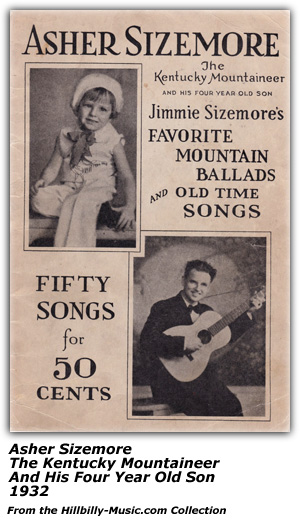 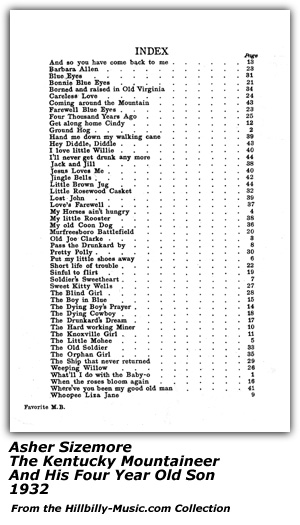
WSM Grand Ole Opry
|
| Time | Artist(s) |
| 7:30 | The Vagabonds |
| 7:45 | Ed McConnell |
| 8:00 | Dr. Humphrey Bate and His Possum Hunters |
| 8:25 | Uncle Dave Macon and Dorris |
| 8:50 | DeFord Bailey |
| 9:00 | Obed Pickard |
| 9:15 | W. E. Poplin and his Barn Dance Orchestra |
| 9:25 | Asher and Little Jimmie |
| 9:40 | Paul Warmack and His Gully Jumpers |
| 10:00 | Amos 'n' Andy (NBC Network) |
| 10:15 | The Vagabonds |
| 10:30 | Arthur SMith and Dixie Liners |
| 10:45 | Zeb and Curley |
| 10:55 | Obed Pickard |
| 11:05 | G. W. Wilkerson and his Fruit Jar Drinkers |
| 11:30 | DeFord Bailey |
| 11:40 | Crook Brothers' Barn Dance Band |
| Source: | The Nashville Banner - November 5, 1932 |
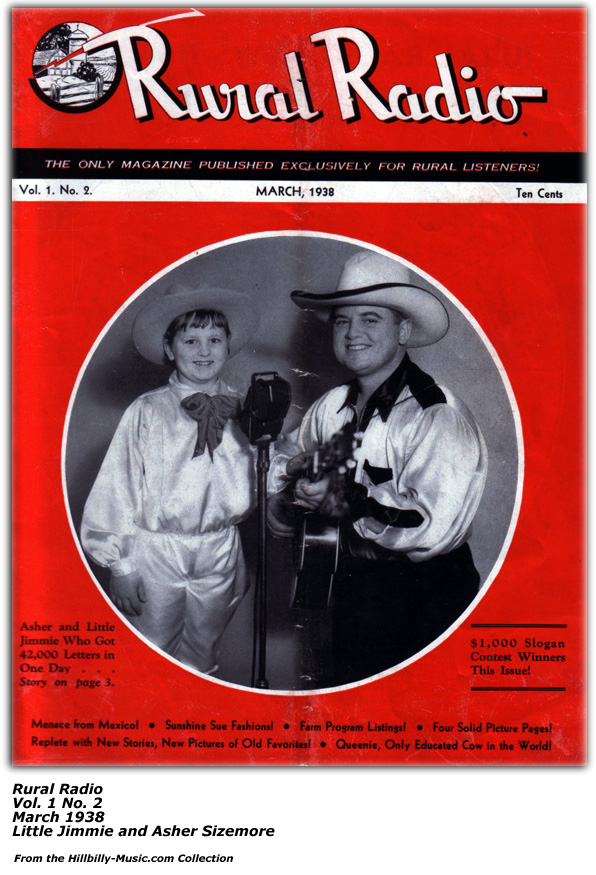
|
| Time | Artist(s) |
| 7:30 | Roy Acuff and his Boys |
| 7:45 | Jack Shook and his Missouri Mountaineers |
| 8:00 | Golden West Cowboys |
| 8:15 | Uncle Dave Macon |
| 8:30 | Roy Acuff |
| 8:45 | Sam and Kirk McGee |
| 9:00 | Jack Shook and his Missouri Mountaineers |
| 9:15 | DeFord Bailey |
| 9:30 | Asher and Little Jimmie |
| 9:45 | Golden West Cowboys |
| 10:00 | Possum Hunters |
| 10:15 | Tennessee Song Birds |
| 10:30 | Roy Acuff and His Boys |
| 10:45 | Andrews Brothers |
| 11:00 | Golden West Cowboys |
| 11:15 | Sam and Kirk McGee |
| 11:30 | Fruit Jar Drinkers |
| 11:45 | Gully Jumpers |
| Source: | The Nashville Banner - February 18, 1939 |
After Jimmie decided to go on his own performing and otherwise around 1950, he took on various roles.
DePauw University and University of Miami
In 1946, Jimmie decided he wanted to go to college, so he enrolled in DePauw University in Greencastle, Indiana. He was awarded a Rector scholarship after applying for it and meeting the requirements. The scholarship was said to be of a $5,000 value. But he told John Rumble in 2004, it was too cold, so he got in his car and drove south. He ended up in Miami, Florida. He enrolled and graduated with a degree from the University of Miami. His major was accounting and bookkkeeping. When he graduated, he took a positiion with a local firm. But after two years, four walls and a stack of papers as he described it was not his 'style.' He told his employer thanks and appreciated they hired him, but he wanted to be 'outdoors'. He began to do home interior work as he had always been kind of tinkering on the side. He had built a bar and other fixtures and friends began asking him to build things for them. He had started his own business.
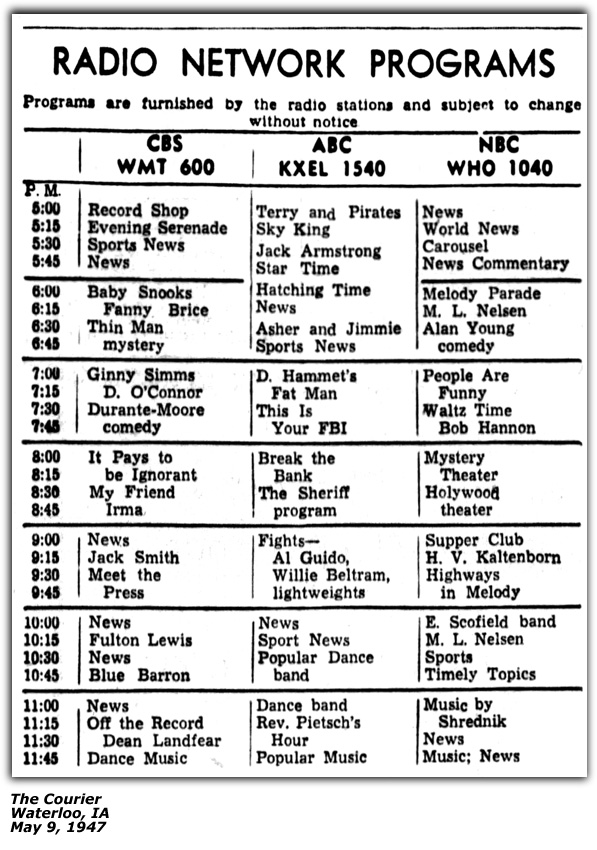
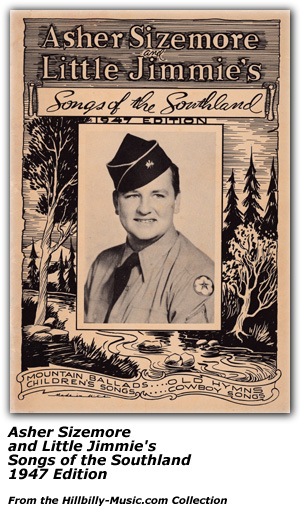
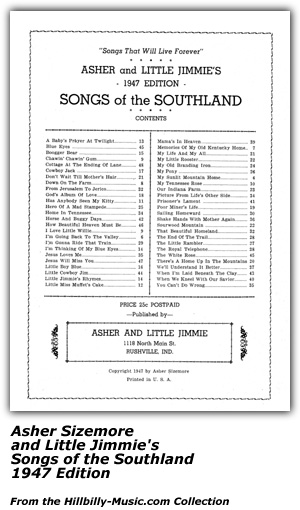

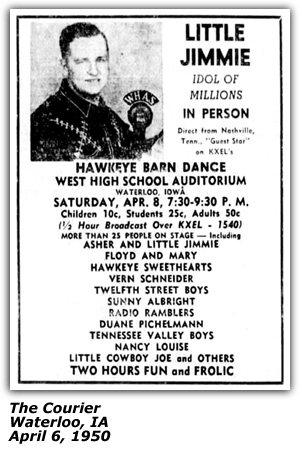
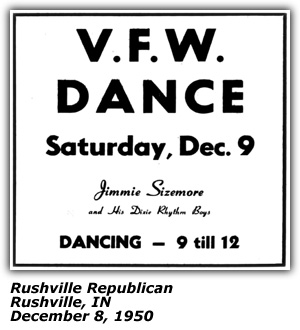
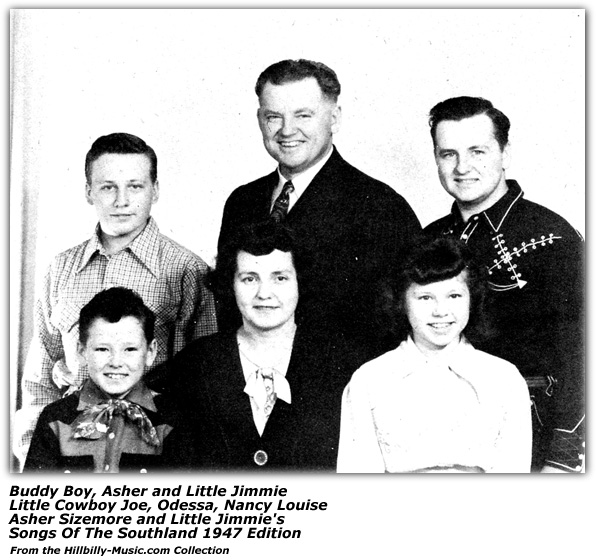

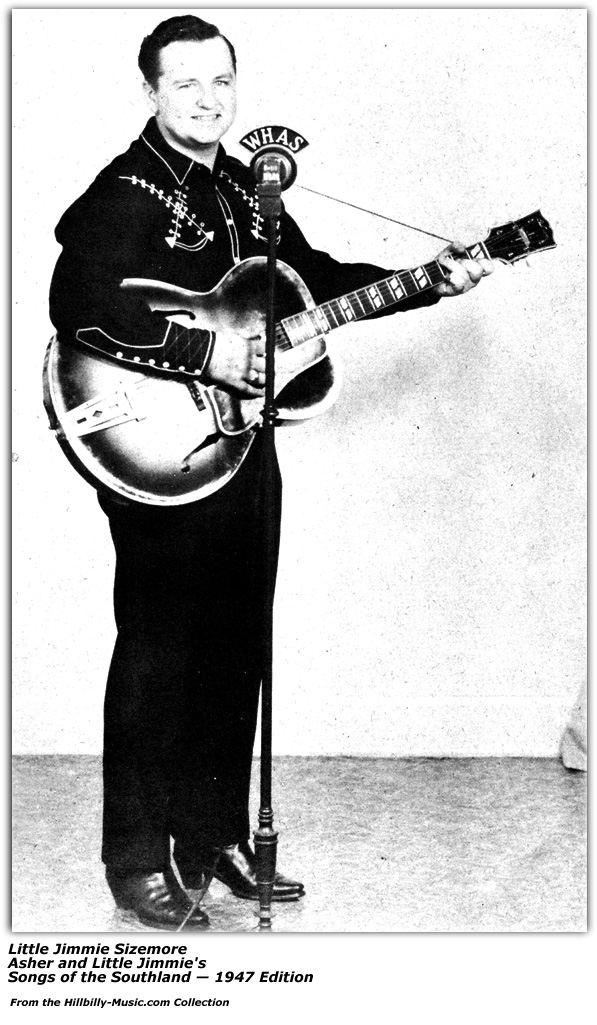
Forms His Own Band — 1950
In 1950, Jimmie started his own band that played in the Indiana area. It was Jimmie Sizemore and His Dixie Rhythm Boys. Promotional ads were seen in the local Rushville Republican newspaper. During this time, Jimmie was working at the newspaper as Assistant Manager.
Puerto Rico
Jimmie was offered a sales position in Puerto Rico, selling real estate. He had never been there but saw an opportunity. He was there when other cities and land began to be developed. He mentions Cape Coral. Port Charlotte. He also spent time in St. Thomas in the Virgin Islands. But after a while, he got back into doing interior design work - building custom fixtures that he had done before such as the bar he mentioned. He did well he said - at the time, he had no competition.
Muskogee, Oklahoma
Things changed and he and his wife moved once again. They started off going west - looking for a place they might want to live. They drove all the way to the west coast to San Francisco, Los Angeles then headed back east with stops in El Paso, Houston and New Orleans. But they settled on Muskogee, a town they first visited on their trek west. The year was about 1975. His wife loved the city. They ended up moving there and once again Jimmie was doing his design / interior work and did well he said - 'prospered' as he put it.
Florida
But he got pneumonia one year and the doctor advised him to move - to Florida. So again, he was in Florida. Found work as a consultant for the 7-11 Corporation there. They valued his people skills as he termed it. During his discussions with John Rumble in 2004, he confirms he was living in Florida at the time.
All through the time, he still kept up his interest in music and playing the guitar, sometimes going to open mic nights at local clubs.
Arkansas
In August of 1963, the Federal Communications Commission gave approval to the equipment for a new radio station (KGMR) in Jacksonville, Arkansas. Benny Rice was the station general manager at the time. Station manager was Jimmie Sizemore and his wife, Joan, was the program coordinator. Owner of the station was Jacksonville Broadcasting Co., Inc. of which C. S. Dupree was president. The station was to operate at 1,000 watts and would be 1500 on the AM dial. The station began broadcasting at 6:00am on Saturday, August 24, 1963. The studios were in downtown Jacksonville while the transmitter was about a mile and a half from town on US Highway 67.
Within a month, the station was in the news. The radio station transmitter was "severly damaged" when it was struck by lightning. Repairs were made after a delay in the shipment of parts and the station was back on the air in a short time.
Album Releases - Decca and Old Homestead
In 1967, Decca released an album of tunes by Asher and Little Jimmie, "Mountain Ballads and Old Hymns." The album came about from a conversation that Jimmie had with the Wilburn Brothers during the annual Disc Jockey Convention or Opry Birthday Celebration week in Nashville. Jimmie mentioned that he and his dad had made transcriptions for World Broadcasting Co., a company that Decca had bought. Owen Bradley found some of the masters and Decca released an album. Jimmie said Decca had enough material for up to ten more albums. The initial release was set for a distribution goal of 20,000 copies.

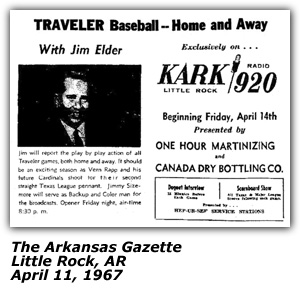
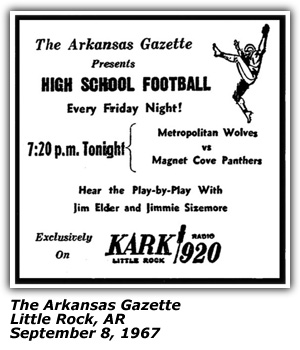
Wisconsin
One of the country's largest country music festivals in 2005 was in Wisconsin. Most of the acts packed up and left after doing their appearances. But one did not. Jimmie Sizemore was sticking around to play some shows locally and doing a CD with a group of local musicians. He was 78 at the time. Columnist Jim Lundstrom talked with Jimmie and how he had come to Wisconsin.
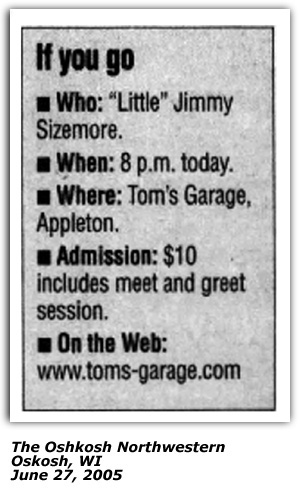 Jimmie had a friend in the area, Jeff Keepper, a musician who had seen Jimmie perform at an open microphone
session in Sarasota, Florida. Jeff got to talking with Jimmie at this session and his jaw dropped at the stories
he would tell him. Jeff thought it would be a good idea for Jimmie to meet with some of the Jeff's friends
in the area at other festivals. He met up with Glenn Campbell whom he saw at the Porterfield Country Music Festival
in the Upper Peninsula in June 2005. He met the boys of Rascal Flatts at Country USA in June 2005 as well.
Later, he was going to attend the Hodag Festival in July 2005. He was scheduled to appear Tom's Garage
with Andy Labahn of Andy's Automatics as his opening act.
Jimmie had a friend in the area, Jeff Keepper, a musician who had seen Jimmie perform at an open microphone
session in Sarasota, Florida. Jeff got to talking with Jimmie at this session and his jaw dropped at the stories
he would tell him. Jeff thought it would be a good idea for Jimmie to meet with some of the Jeff's friends
in the area at other festivals. He met up with Glenn Campbell whom he saw at the Porterfield Country Music Festival
in the Upper Peninsula in June 2005. He met the boys of Rascal Flatts at Country USA in June 2005 as well.
Later, he was going to attend the Hodag Festival in July 2005. He was scheduled to appear Tom's Garage
with Andy Labahn of Andy's Automatics as his opening act.
On Jimmie's schedule was a recording session at the Rock Garden Studio to do a full length CD with local musicians Jeff JOhnson and Gary Shaw on guitar; Doug Cobb on mandolin; Jason (Red) Brown on standup bass; Brian Gruselle on keyboards and Jason Van Ryzin on drums.
Jeff also took Jimmie to several open mic sessions at clubs such as Apple Pub and M&M in Little Chute. Jimmie would sing and also tell the audience some of his stories. One that Jimmie liked to tell was playing cowboys and Indians at WHO in Des Moines one summer in the studio. His dad Asher had to shush them just before they went on the air. The fellow he was playing with was a young Ronald (Dutch) Reagan. Jimmie said he was "Dutch" to him back then.
He appeared at the Country USA festival in Wisconsin in June of 2005. Jeff Potts wrote that Jimmie was "...one of the few sources left to speak about the earliest roots of country music."
Mr. Potts quoted Jimmie, "When the Opry has a question about the old days, they call me first." He went to reiterate a point he made in a 2004 interview with John Rumble, "Country wasn't accepted at the that time. My dad really had to work to promote it and convince people of its value."
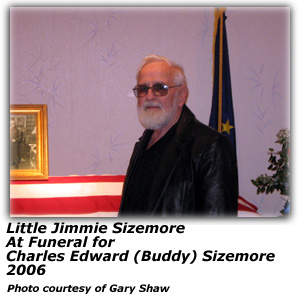 |
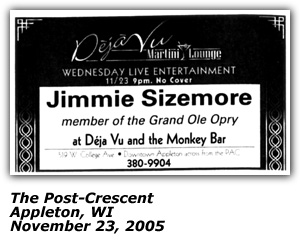 |
Jimmie also spent 18 months playing guitar with New Orleans jazz clarinet legend, Pete Fountain.
He told Mr. Potts in 2005:
"I've still got a lot of life in me. I plan on performing right up to the very end."
Family — Marriages
The Rushville Republican (IN) reported that Jimmie married Helen Elaine Casey on March 8, 1948 in Covington, KY. She was employed at the International Furniture Factory. The Society page article mentions Jimmie was a radio entertainer.
Jimmie and Helen got divorced. She remarried to Fred Bane on October, 30, 1960. Helen passed away on August 24, 2019. She had worked for Stokely-Van Camp as an accountant and bookkeeper for over 20 years.
Ancestry records show that he married the former Joan Rae Jones on November 10, 1957 in Campbell County, Tennessee. At the time, Jimmie was living in Louisville, KY; Joan was from Jeffersonville, KY. The couple divorced on November 15, 1968 in Pulaski County, Arkansas. Joan remarried Col. McLyle Zumwalt; they were married for 27 years. She passed away on December 18, 2021.
Upon his passing in Appleton, Wisconsin in 2014, he was survived by six daughters: Susan Sally, Kathy, Lisa, Kelly, and adopted daughter, Dina (Fabian) Sizemore-Rivero. He is buried in East Hill Cemetery in Rushville, Indiana. His brother, Buddy Boy (Charles) is buried in the same cemetery, but in the Veterans Section.
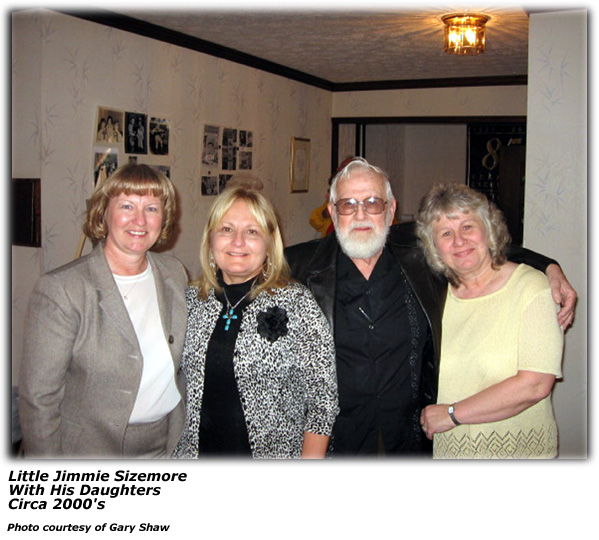
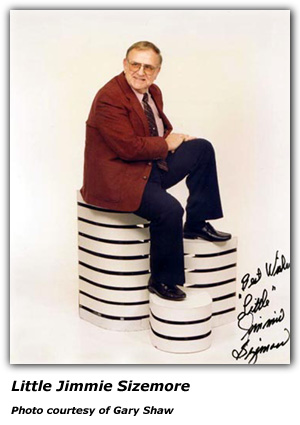
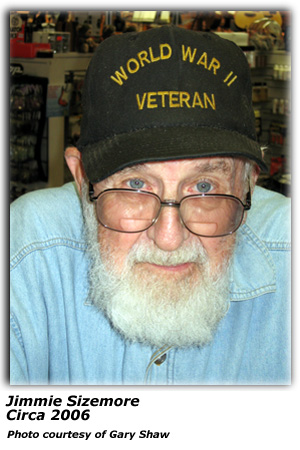
Credits & Sources
| Printer Friendly Version |
Hillbilly-Music.com
Yes, Hillbilly Music. You may perhaps wonder why. You may even snicker. But trust us, soon your feet will start tappin' and before you know it, you'll be comin' back for more...Hillbilly Music.
Hillbilly-music.com ...
It's about the people, the music, the history.
|
Copyright © 2000—2023 Hillbilly-Music.com
|
||||